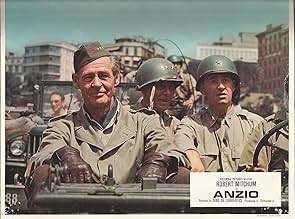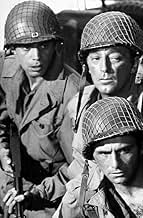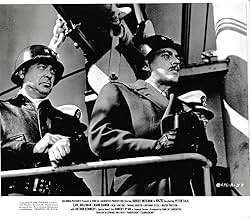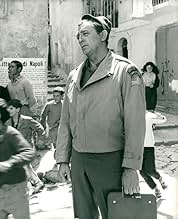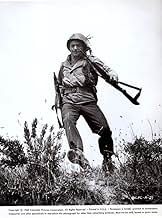अपनी भाषा में प्लॉट जोड़ेंA war correspondent witnesses errors of the Allied Command after he and a unit of US Army Rangers land unopposed at Anzio, Italy, but later become trapped behind German lines during one of t... सभी पढ़ेंA war correspondent witnesses errors of the Allied Command after he and a unit of US Army Rangers land unopposed at Anzio, Italy, but later become trapped behind German lines during one of the bloodiest battles of WWII.A war correspondent witnesses errors of the Allied Command after he and a unit of US Army Rangers land unopposed at Anzio, Italy, but later become trapped behind German lines during one of the bloodiest battles of WWII.
कहानी
क्या आपको पता है
- ट्रिवियाPeter Falk in his 2006 autobiography "Just One More Thing: Stories of My Life" stated that he didn't like the script for this film, finding it hackneyed and full of cliché; he wanted to leave the film for these reasons. However, producer Dino De Laurentiis encouraged him to stay by giving him film-poster name-above-the-title credit as well as choice of writer for his dialogue. Falk stayed on the picture and apparently actually wrote his own dialogue.
- गूफ़Toward the beginning of the film, Cpl. Jack Rabinoff (Peter Falk) is in the back of a Red Cross ambulance with three prostitutes and grabs a shoebox-sized box labeled "Hershey's Milk Chocolate Multi Pack" with a "1968 design" of the Hershey logo. One of the prostitutes reaches into the box and pulls out a "1968 design" box of Brach's Milk Chocolate Stars. In addition to the two anachronisms, Hershey's and Brach's are two separate companies.
- भाव
Dick Ennis: [attending to Rabinoff who went into sudden convulsions] Look, fellows, I think he can use the air more then the company, okay? Anything anybody can do?
Cpl. Jack Rabinoff: No, unless you have a band-aid.
Dick Ennis: Very funny.
Cpl. Jack Rabinoff: Oh, it's murder. The stomach, you see? A Japanese grenade ripped my insides. Got medal in there. Under tension it contracts and all hell breaks loose. I must have been tense.
Dick Ennis: Good thinking. You belong in a hospital, not in a war.
Cpl. Jack Rabinoff: Yeah, that's what they said when they sent me home.
Dick Ennis: You mean you got out, then you went to Canada and joined this outfit?
Cpl. Jack Rabinoff: That's right.
Dick Ennis: How did you get past the doctors?
Cpl. Jack Rabinoff: Lied about my age.
Dick Ennis: You gotta be crazy. Half your guts blown out and you're back here. What for?
Cpl. Jack Rabinoff: Awkward time for a interview.
Dick Ennis: You got something better to do? Why did you re-enlist?
Cpl. Jack Rabinoff: Why? Because I like it, you know. I missed it, Ennis. With all the mud and pain, these clowns giving orders, there's nothing like it. Look, a guy sells shoes for 40 years. I live more in one day, I see more and feel more. I taste more, I think more. I'm more, understand? I'm more. There's more to living than breathing. Capisce?
Dick Ennis: Capisce.
Cpl. Jack Rabinoff: You're the same way, that's right. War is part of you. You belong to it and when this one's over, you'll find another and I hope I'm with you.
- कनेक्शनReferenced in The Carol Burnett Show: Nanette Fabray and Steve Lawrence (1970)
Basically, Robert Ryan plays General Mark Clark who was in charge of the operation and was in overall command of the Fifth Army. He was an interesting guy for a general -- tall, vain, brave, half-Jewish, a large-featured face like the mask of Tragedy, carrying around a sidearm as a prop. Arthur Kennedy plays General John P. Lewis (modeled after Gen. Lucas), in charge of the landings themselves. Mitchum accuses him of being "timid" (three times) and in a way he was, although it wasn't entirely his fault. Arthur Franz has a small role as General Lucian K. Truscott, the junior general in command of the Third Division (Audie Murphy's division). All the names have been changed to protect the guilty.
Here, basically, is how it worked. The Allies of half a dozen nationalities were being slaughtered throwing themselves against the German Gustav line, which ran across the Italian boot from sea to sea, commanded by the unconquerable Monte Cassino. The Anzio landings were designed to catch the enemy by surprise from behind and relieve pressure at the Gustav line. Mark Clark (who saw to it that any reference to the Fifth Army in the press appeared as a reference to "Mark Clark's Fifth Army") had supervised similar earlier landings at Salerno. They were successful, but just barely. The landings at Anzio were handed over to Lucas, whose orders included a drive inland, if possible, to the Alban Hills which commanded a perfect view of the beachhead and the main highway to Rome. Lucas had just troops enough to dig in and consolidate or to race pell mell to the Alban Hills, but not enough troops to do both. Lucas was advised by Clark, "Don't stick your neck out like I did at Salerno." (The line is directly quoted in the movie, but is given to Robert Ryan's fictional general.) So Lucas didn't stick his neck out. He went inland seven miles, stopped short of the Alban Hills, and dug in. Clark, who was on the beach, agreed with the decision.
And Lucas wasn't the cocksure but mistaken strategist played by Arthur Kennedy. The real General Lucas kept a diary and it's full of gloomy forebodings. The Germans, under Kesselring and Mackensen, were caught unprepared. Nothing stood between the allies and the Alban Hills, or Rome for that matter. But Lucas did nothing, and for good reasons. He didn't have the resources to take Rome and hold it. Except for the probe by Rangers, as shown on screen, and others by British troops, everyone dug in and waited for the German reinforcements to deploy, which happened apace. Kesselring was a very efficient tactician and had plenty of time to bring in troops in the stalled Allied beach head.
Instead of Anzio rescuing the troops at the Gustav line, the situation was turned around. In the end, some 24,000 American and 9,000 British casualties were evacuated from the beachhead. Clark fired Lucas and gave command to Truscott. When the German resistance finally collapsed, General Clark had an opportunity to drive eastward across the Italian boot and cut off the German troops to the south. He chose instead to forget about capturing the German army and to zip his own troops north along the highway to Rome so that he could "conquer" the open city. You know -- like Julius Caesar? The German army promptly withdrew north to their next massive defense line, where the Allied advance stalled again.
I leave it to the viewer to decide which story is more engaging, the historical one or the plot we see on the screen, which is mostly the story of seven survivors of the Ranger patrol who try to make their way back to Anzio, a story we've seen many times before. I wish I could at least say that the story presented on screen is well done but the fact is that it's not. This is one of Mitchum's lazier performances. Sometimes he sounds positively drunk. No one else stands out, including Peter Falk, who has the reactivity of a noble gas. Arther Kennedy is the smarmy General Whatever-his-name-is. And some other posters are absolutely right about the score. Whew! A simple-minded would-be catchy love song doesn't turn into a martial theme just because you throw some snare drums behind it and play it as a march.
What a missed opportunity.
- rmax304823
- 16 जून 2004
- परमालिंक
टॉप पसंद
- How long is Anzio?Alexa द्वारा संचालित
विवरण
- रिलीज़ की तारीख़
- कंट्री ऑफ़ ओरिजिन
- भाषाएं
- इस रूप में भी जाना जाता है
- Anzio
- फ़िल्माने की जगहें
- Royal Palace, Caserta, Campania, इटली(opening scene)
- उत्पादन कंपनियां
- IMDbPro पर और कंपनी क्रेडिट देखें
- चलने की अवधि1 घंटा 57 मिनट
- पक्ष अनुपात
- 2.35 : 1
इस पेज में योगदान दें



